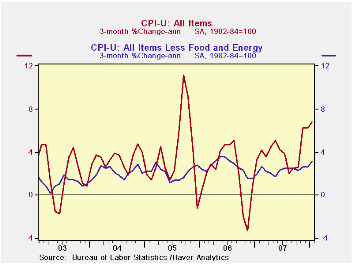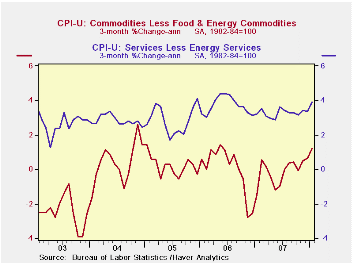 Global| Feb 20 2008
Global| Feb 20 2008U.S. CPI Total Stable, Core Strongest Since 2006
by:Tom Moeller
|in:Economy in Brief
Summary
The consumer price index (CPI-U) rose 0.4% last month, the same as during an upwardly revised December increase. (New seasonal factors were introduced for the last three years.) The latest increase was slightly ahead of expectations [...]

The consumer price index (CPI-U) rose 0.4% last month, the same as during an upwardly revised December increase. (New seasonal factors were introduced for the last three years.) The latest increase was slightly ahead of expectations for a 0.3% rise. It also lifted the y/y comparison to its fastest since October 2005.
Less food & energy, consumer prices rose 0.3% in January. That also was ahead of expectations for a 0.2% gain and it was the quickest since June of 2006. A Comparison of Measures of Core Inflation from the Federal Reserve Bank of New York can be found here.
A faster 0.7% gain in food & beverage prices was the strongest since early last year. Prices for meats poultry & fish surged 0.8% (5.4% y/y) and prices for fruits & vegetables jumped 2.2% (6.2% y/y). Cereal & bakery product prices also have been quite strong and posted a 0.6% gain (5.7% y/y).
Core services prices rose 0.4% (3.4% y/y) and that was the fastest m/m rise since 2006. Shelter prices rose the same 0.3% (3.1% y/y) as during the prior two months. Owners equivalent rent of primary residence, a measure not equivalent to other house price measures, also rose 0.3% (2.8% y/y). Medical care services prices, however, were strong. The 0.6% increase doubled the December (5.7% y/y) rise. Tuition costs also posted a strong 0.6% (5.7% y/y) rise but the increase in public transportation prices cooled to 0.4% (5.8% y/y).
Core goods prices rose 0.2% and that was the fastest increase since early 2006. It mainly reflected a 0.4% rise in apparel prices that still left them down 0.2% y/y. Medical care commodity prices also were strong and rose 0.5% (2.5% y/y) but most other goods price increases were tame. Prices for new & used motor vehicles fell 0.1% (0.0% y/y) during January and prices of household furnishings & operation ticked up 0.1% (-0.5% y/y) after two months of having been unchanged.
Energy prices rose just 0.7% last month, well off the double digit rates of increase during the prior four months. The gain in gasoline prices eased to only 1.2% (34.5% y/y) and the weekly data already show a slight m/m decline this month. Prices for fuel oil & other fuels, however, were quite strong and rose 3.7% (34.7% y/y) but natural gas & electricity prices fell 0.5% (+3.% y/y). The chained CPI, which adjusts for shifts in the mix of consumer purchases rose 0.5% (+3.9% y/y) and the core measure rose 0.3%, its fastest gain since October. This latter measure is similar to the core PCE price index but its treatment of housing price differsPublishing Central Bank Interest Rate Forecasts from the Federal Reserve Bank of San Francisco can be found here.
| Consumer Price Index | January | December | November | Jan Y/Y | 2007 | 2006 | 2005 |
|---|---|---|---|---|---|---|---|
| Total | 0.4% | 0.4% | 0.9% | 4.4% | 2.9% | 3.2% | 3.4% |
| Total less Food & Energy | 0.3% | 0.2% | 0.2% | 2.5% | 2.3% | 2.5% | 2.2% |
| Goods less Food & Energy | 0.2% | 0.0% | 0.1% | 0.2% | -0.4% | 0.2% | 0.5% |
| Services less Energy | 0.4% | 0.3% | 0.3% | 3.4% | 3.4% | 3.4% | 2.8% |
| Energy | 0.7% | 1.7% | 6.9% | 20.4% | 5.6% | 11.0% | 17.0% |
| Food & Beverages | 0.7% | 0.1% | 0.4% | 4.9% | 4.0% | 2.3% | 2.5% |
| Chained CPI: Total (NSA) | 0.5% | -0.1% | 0.5% | 3.9% | 2.5% | 2.9% | 2.9% |
| Total less Food & Energy | 0.3% | -0.1% | 0.0% | 2.2% | 2.0% | 2.2% | 1.9% |
Tom Moeller
AuthorMore in Author Profile »Prior to joining Haver Analytics in 2000, Mr. Moeller worked as the Economist at Chancellor Capital Management from 1985 to 1999. There, he developed comprehensive economic forecasts and interpreted economic data for equity and fixed income portfolio managers. Also at Chancellor, Mr. Moeller worked as an equity analyst and was responsible for researching and rating companies in the economically sensitive automobile and housing industries for investment in Chancellor’s equity portfolio. Prior to joining Chancellor, Mr. Moeller was an Economist at Citibank from 1979 to 1984. He also analyzed pricing behavior in the metals industry for the Council on Wage and Price Stability in Washington, D.C. In 1999, Mr. Moeller received the award for most accurate forecast from the Forecasters' Club of New York. From 1990 to 1992 he was President of the New York Association for Business Economists. Mr. Moeller earned an M.B.A. in Finance from Fordham University, where he graduated in 1987. He holds a Bachelor of Arts in Economics from George Washington University.
More Economy in Brief
 Global| Feb 05 2026
Global| Feb 05 2026Charts of the Week: Balanced Policy, Resilient Data and AI Narratives
by:Andrew Cates






